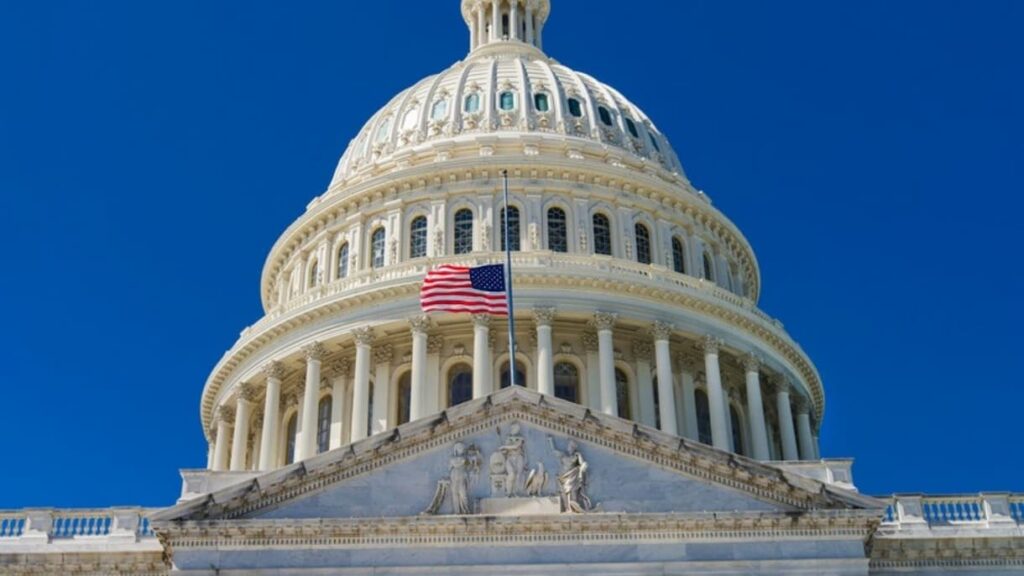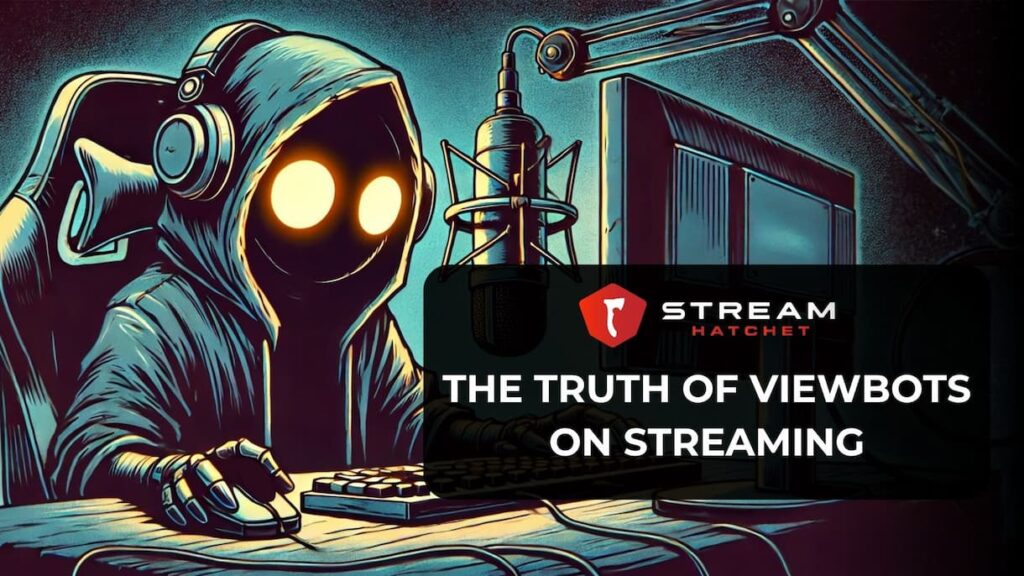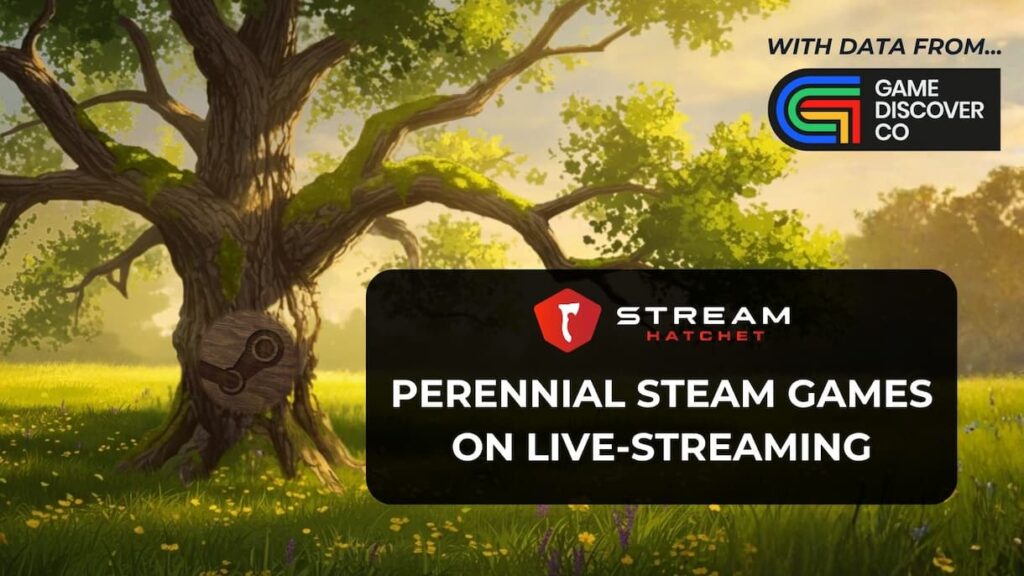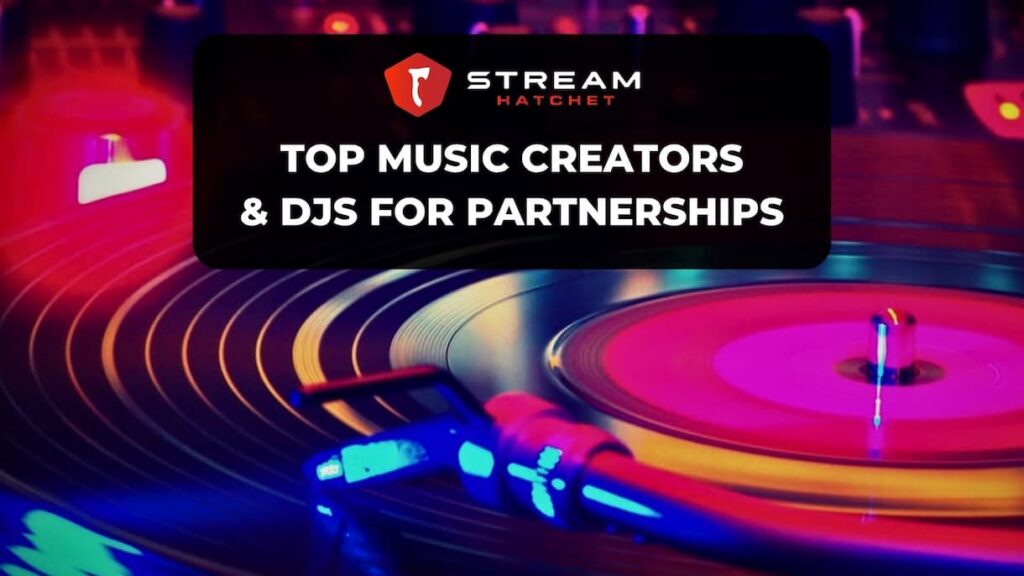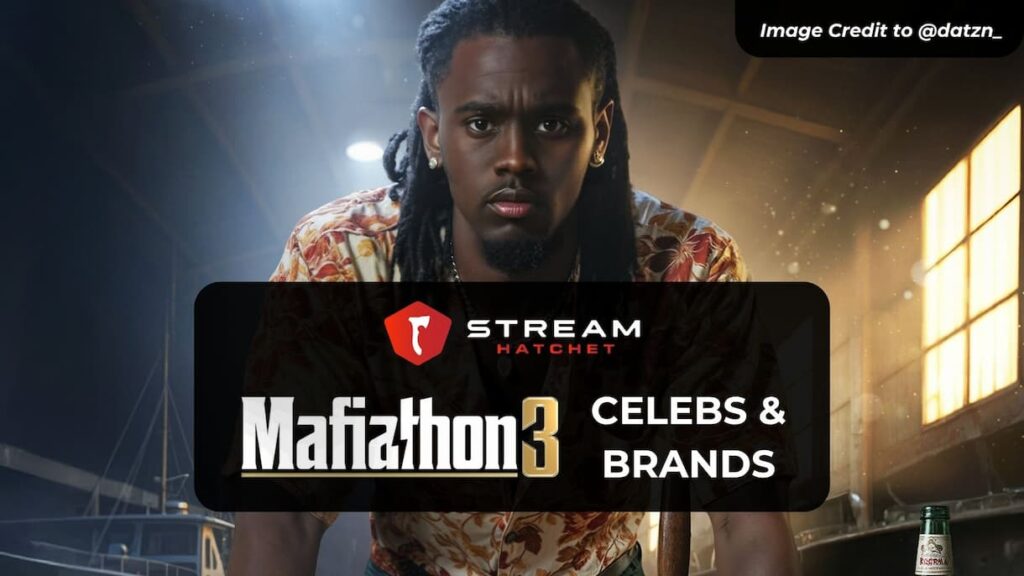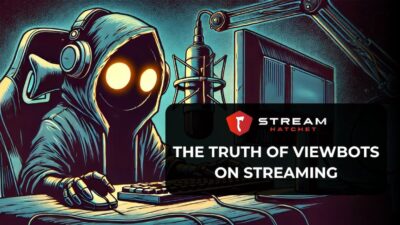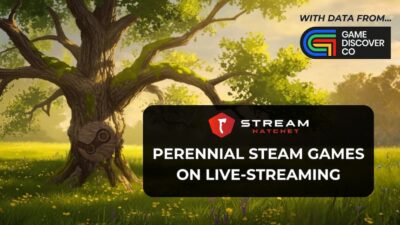Well into the 21st century, politicians are realizing the importance of online, decentralized media for reaching their voter base. While traditional media outlets like 24/7 news channels may boast about their historical legacy, their reputation has been damaged by “fake news” claims and exposés on inherent bias. Viewers now turn to specialized commentary channels online by personalities they’ve grown to trust through many hours of viewership: Social media accounts, podcasts and, of course, live streaming channels.
Live streaming offers incredible variety for politicians and speculators. Serious debates and sessions with audience interaction can be hosted online, such as one of the earliest political uses of live streaming: Bill Clinton’s live Q&A session in 1999 using RealPlayer. Alternatively, live streaming can humanize candidates with frivolous fare, such as vice presidential candidate Tim Walz playing Crazy Taxi on Twitch. With such a diversity of use cases among the various live-streaming platforms, a select few have become the go-to options for political commentators.
In this article, we look at the relative popularity of political content on different live-streaming platforms, including some of the top political streamers. These are just a select few insights from our recently released Politics in Live Streaming 2024 Report – the full report can be accessed for free here:
Growing Interest in Political Content Benefits Rumble
With the U.S. Presidential election dominating political discourse throughout much of 2024, it’s no surprise to see live-streaming viewership for said content gradually rising month-on-month. Looking first at Twitch, political viewership tripled from roughly 5M hours watched in January up to 15M hours watched in July and August each. Twitch is a fairly good barometer for live-streaming trends, and this demand for political content required extra safeguards for users. Just a few days ago, Twitch announced a new Politics and Sensitive Issues Content Classification Label which requires streamers to use it if their stream focuses primarily on this kind of content. Unsurprisingly, this caused some backlash from streamers who felt this label was censoring or marginalizing their opinions.
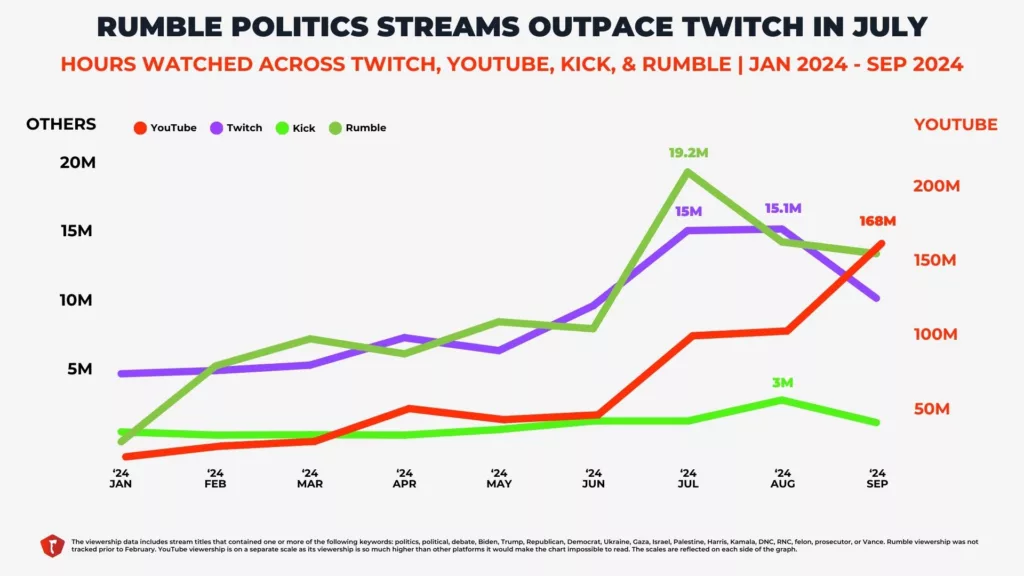
The relatively new live-streaming platform Rumble has been the primary refuge for streamers seeking to voice their political opinions in an unrestricted space. Rumble’s July peak of 19M hours was largely driven by discussion around the assassination attempt on Donald Trump, while Trump’s own stream of the Republican National Convention on the 18th of July generated 344K hours watched. Rumble is a much smaller platform than Twitch overall, and so this kind of viewership is a massive boon. To put things in perspective, Rumble has amassed 19% more hours watched of political content than Twitch since July, and political content accounts for 32% of all viewership on the platform.
Leagues ahead of the competition, however, is YouTube – note the graphic above has a different scale for YouTube viewership which is an order of magnitude higher than any other platform. YouTube Live dominated in September, capturing 87% of political live streaming demand with 168M hours watched during the Trump-Harris debate. Additionally, the platform’s political viewership has grown by 530% since January – the most out of any platform this year. However, YouTube has likely been subject to potential view botting on certain streams – a topic explored more fully in the full Politics in Live Streaming Report.
Different Platforms Center on Different Political Regions
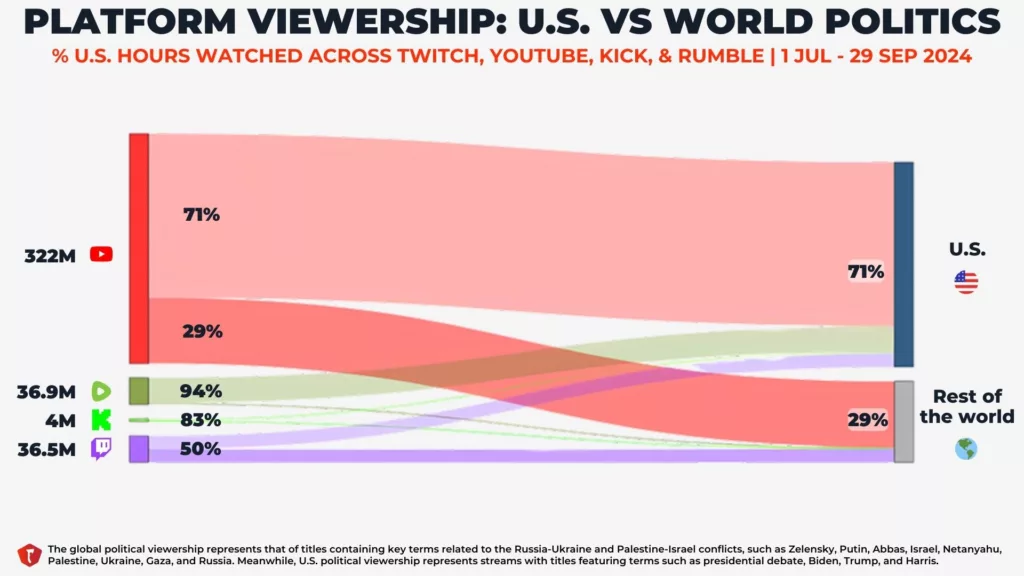
Naturally, different live-streaming platforms tend to focus on different global issues due to their varying user demographics. On the whole, 71% of all political content viewership came from coverage of U.S. political events (the election, debates, etc.) whereas just 29% focused on global political events (Russia-Ukraine, Israel-Palestine, etc.). YouTube gave the most accurate representation of this split in viewership, with political live streams perhaps being produced by content creators already known for their pre-recorded videos.
Twitch and Rumble deviate from this expected split, however. Rumble almost exclusively covered U.S. politics (94%), attributable to the overwhelming interest in Rumble’s GOP debate commentary from various sources. Meanwhile, audiences on Twitch were split (50%) – most likely due to the larger and more diverse user base. While there was interest in the Biden-Trump Debate and Trump-Harris Debate on Twitch, commentary on geopolitical issues and foreign elections (such as the French and Mexican elections) were just as sought after.
The Most Popular Political Creators Dedicated to Online Commentary
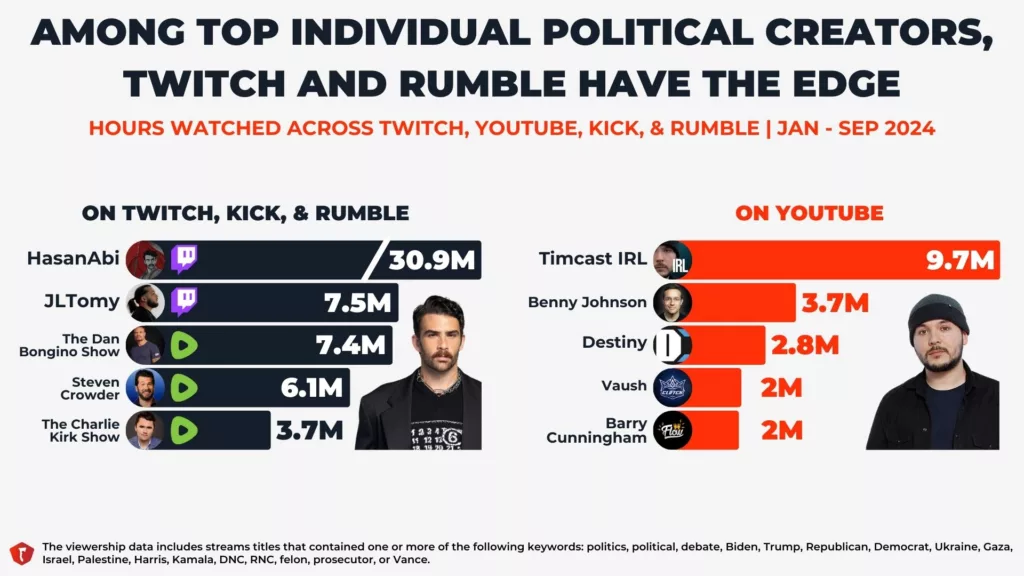
Of course the major reason for this different interest across live-streaming platforms comes down to their key content creators. While YouTube may have had the lead in overall political viewership, Twitch and Rumble stand out more for their distinct personalities. HasanAbi has generated 30.9M hours watched of political content in 2024 so far, and across the popular months of July and August he generated 28% of all political content viewership on Twitch. This demand is to be expected, given that HasanAbi frequently features in the top Twitch streamers overall. The next most popular political content creator, French streamer JLTomy, generated just 7.5M hours watched from his streams around the Israel-Palestine conflict.
Meanwhile, Rumble’s biggest personalities Dan Bongino (of The Dan Bongino Show) and Steven Crowder fell just short of Twitch’s top political creators with 7.4M and 6.1M hours watched, respectively. However, they also attained higher peak viewerships than HasanAbi with peaks of 350K and 222K viewers each. Both creators are well known for their generally right-wing commentary and are praised as advocates for free speech. The only standout creator on YouTube Live was Timcast IRL with 9.7M hours watched in 2024 – another right-wing commentator and podcast host.
While politics is rising in popularity overall, it appears to be mostly right-wing commentators and controversial events driving this viewership. With election day tomorrow, people will be tuning in en masse to follow the race live. Stream Hatchet will report on the uptick in demand for political content on election day, and on the aftermath of speculation that is sure to follow.
To discover more about debate viewership and chat sentiment for different political candidates, download Stream Hatchet’s full Politics in Live Streaming 2024 Report for free:

